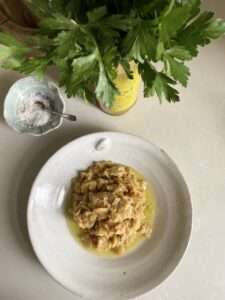split fava beans and bulgur wheat

A nutritious low cost meal, “baklet foul” (بقلة فول ) is a comforting pale yellow dish made from split fava beans popular in rural Lebanon. We’ve borrowed this no-frills recipe from New Flavours of the Lebanese Table by Nada Saleh. While the eastern Mediterranean have a long history of eating beans, you might be forgiven for thinking this isn’t part of the UK’s cooking DNA.
However, one of the earliest records of cookery instruction from the 14th century, The Forme of Cury (cookery), indicates that eating beans was certainly part of the diet in England in the Middle Ages. The manuscript from the British Library contains instructions for a dish of “benes yfryed”. Minced garlic and onion are added before you “frye hem in oil oper in grece, and do pereto powder douce”. Interesting to note that they were cooking with olive oil in those days! If Nada Saleh had rewritten this old English “recipe”, it would appear totally at home in the context of a healthy Lebanese diet. Yet here it is in an English cookery manual.
Hodmedods, who grow fava beans, encourage us in the UK to eat more beans. Fava beans have a high protein content, 24.7g per 100g. When mixed with bulgur wheat, they create a “complete protein”. On their own they are incomplete, so if you’re following a vegan diet combining them is essential. Helpfully, you don’t need to soak split fava beans overnight, and they cook in around 25 minutes. Using only five ingredients, the quality of your extra virgin olive oil will count for a lot. Too green and the oil becomes too intrusive. Zejd’s mild, yet fruity oil suits the simplicity of this dish perfectly.
etymological footnote
Some regions in Lebanon use the Arabic word “baklet” بقلة to refer to things that grow in the earth, particularly grains and beans. The verb بقل means to sprout in Arabic. In this recipe it refers to bulgur wheat, rather than purslane, the salad plant, which is often described as baklet بقلة.
Serves 4 generously
ingredients
225g split fava beans (yellow)
4 tablespoons Zejd extra virgin olive oil
2 medium onions, finely chopped
1 tsp salt
120g bulgur wheat, coarse, (rinsed in a seive under running water)
a drizzle of extra virgin olive oil to serve
method
- Place the beans in a pan with 1 litre of water. (Soaking the beans for 15 minutes beforehand will reduce the cooking time). Skim the foam as it comes to the surface, reduce the heat and cover.
- Meanwhile, chop the onions finely and add to a medium sized saucepan pan with 2 tablespoons of Zejd’s extra virgin olive oil. Add 1/2 teaspoon of salt. Cook on a medium to low heat for about 10 minutes, until the onions are golden brown and soft.
- Once the beans have been cooking for about 15 minutes, add the golden onions, the rinsed bulgur wheat, and the remaining salt to the saucepan. Bring to the boil, reduce the heat to a simmer, and cover. Leave for about 10 minutes for the water to be absorbed, but not dry.
- Check the texture of the beans and bulgur wheat. The beans should be soft, and the bulgur wheat will retain a slight bite. Remove from the heat and stir in the remaining 2 tablespoons of extra virgin olive oil. Cover and leave for 5 minutes before serving. Add a final drizzle of extra virgin olive oil to each plate.
Serve alongside a salad with a lemony dressing. Traditionally a red onion and tomato salad, we added a handful of chopped green cracked olives for another layer of texture. Sadly no kohlrabi at time of writing, otherwise this, finely sliced with a lemony dressing and some green olives, would be delicious too.